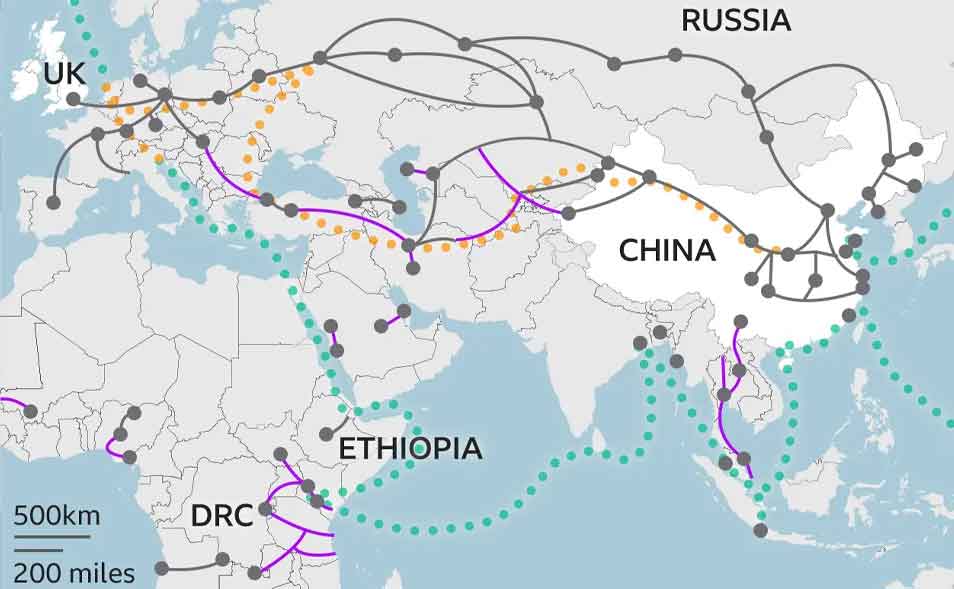
Barran Press
A recent study by the Mocha Center for Strategic Studies has criticized China's neutrality towards the ongoing war in Yemen, arguing that it undermines the Belt and Road Initiative (BRI). The study, titled "The Belt and Road in Egyptian and Yemeni Policies," published in July 2024, recommends a trilateral cooperation between China, Yemen, and Egypt to address the challenges facing the initiative.
The study, Received by "Barran Press", analyzes the BRI's context and its intersection with Egyptian and Yemeni interests, exploring opportunities for trilateral collaboration in light of each country's ability to adapt to transportation, development, and regional stability projects. It also examines the feasibility of establishing a political or security framework to mitigate the initiative's challenges, particularly internal constraints in Yemen and Egypt.
The study highlights that despite the strategic importance of the Suez Canal and the Bab el-Mandeb Strait, Yemen and Egypt are caught in regional instability, hindering the progress of the BRI. It emphasizes the need for a strategy to resolve or mediate the regional conflict in Yemen, crucial for ending the civil war and unifying the country, thereby integrating it into the Chinese initiative. The study advocates for prioritizing stability by creating an environment conducive to establishing a strong government representing the Yemeni Republic and preparing infrastructure to transform coastal cities into thriving trade centers.
The study argues that China's neutrality towards the war is not alleviating the security instability, as it has not taken practical steps towards political settlement. It prefers coordination among influential countries and considers the Saudi-Iranian framework agreement suitable for replication in Yemen.
This approach, according to the study, presents a dilemma for Chinese policy. Given the complexities and intensity of the civil war, the opportunity to contribute to ending the war diminishes due to the involvement of numerous international actors and the breakdown of security at the entrance of the Red Sea, posing a challenge to the development of the BRI in Yemen.
The study emphasizes that bridging the security gap in Yemen is crucial for the smooth operation of the maritime route, alongside efforts to reduce disparities in fulfilling commitments between the two countries.
Therefore, the study proposes a collective framework for relations between China, Egypt, and Yemen, which could contribute to de-escalating the civil war. This umbrella could facilitate negotiations among Yemeni factions or persuade China to abandon its neutrality, promoting cooperation among countries engaged in the initiative to develop a political or security framework for resolving conflicts within member states.
The study further emphasizes the need for a joint security and defense system to protect the BRI and its projects, foster solidarity with allied governments, and empower them to manage and safeguard their resources from depletion and scarcity.
The study recommends considering the development of a regional security strategy, with Egypt, Yemen, and other countries as its core, building upon the stability of the Horn of Africa. It underscores the importance of comprehensive dialogue on regional security, supported by relevant governments and involving China and other BRI partners.
Regarding Yemen, the study highlights the convergence of factors that have hampered the country's foreign policy, leading to the decline of the unification project and escalating conflict over the Imamate and the Republic. This decline has been accompanied by the militarization of areas near Yemen's coast, diminishing the significance of maritime ports and placing them under the control of the Houthi militia.
This crisis, coupled with US support for the continuation of Israeli aggression against Gaza, has left Yemen and Egypt in uncertainty about the fate of development plans and the future of regional security, according to the study.
The study asserts that the ongoing political division in Yemen and the deterioration of security in the Red Sea limit the efficiency of commercial projects between the Suez Canal and Yemeni ports, reducing their attractiveness to major companies.
The study clarifies that the security deficit affects not only Yemen and Egypt but also all ports on both sides of the Red Sea, hindering the initiative at one of its vital points.
China announced the Belt and Road Initiative in October 2013, aiming for cooperation between Asia and Europe. The "belt" refers to the land route from China to Europe, while the "road" represents the maritime network connecting major ports in the Indian Ocean, the Middle East, North Africa, and Europe.
Over the years, over 100 countries and international organizations worldwide have joined the initiative, which has become a tangible reality, reflected in the inclusion of the initiative in the content of important decisions by the United Nations General Assembly, the Security Council, and other bodies.
The initiative, known as "One Belt One Road," integrates road and railway network projects with maritime navigation and transportation networks.
Yemen and Egypt's significance in the BRI lies in their geographical locations. The coasts and ports of both countries are situated at key points in the world, enhancing the feasibility of establishing various projects with comparative advantages due to their proximity to consumption areas in East Africa or the Mediterranean basin.





